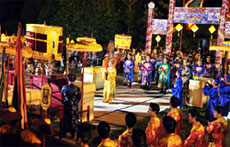 Staged
at the Xa Tac Worshipping Platform in the city’s Thuan Hoa District,
the event included worship rituals celebrating the gods of land (Xa) and
rice (Tac), which were of prime importance for thousands of years
before the fall of feudalism.
Staged
at the Xa Tac Worshipping Platform in the city’s Thuan Hoa District,
the event included worship rituals celebrating the gods of land (Xa) and
rice (Tac), which were of prime importance for thousands of years
before the fall of feudalism.
Flags, palanquins, parasols and old weapons were part of the
procession and it attended by 100 elderly patriarchs representing all of
Thua Thien-Hue Province’s villages.
After three rounds of bells and drums, the procession set off at Thai Hoa Palace,
which houses the throne, and made its way through Ngo Mon (main gate to
the Forbidden City), Le Huan and Ngo Thi Nham streets to the Xa Tac
Worshipping Platform.
The worship rituals began at the platform at 8pm and lasted for an
hour, beginning with the washing of hands and then planting incense,
welcoming genies, offering white gems, chanting eulogies, offering wine,
removing offerings, sending genies off, and burning written eulogies.
In 1806, the Xa Tac Platform was built to the west of the citadel by
Gia Long, the first king of Nguyen Dynasty, to worship rice and soil,
the two most essential elements of wet-rice agriculture, according to
historians.
Following the king’s orders, the raised platform was made of soil taken from every part of the country.
As one of the most important sanctuaries under the Nguyen Dynasty, it
is on a par with Nam Giao Platform, which worships God. Other temples
worship the dynasty’s ancestries and late kings of the dynasty.
During the Nguyen Dynasty, Xa Tac worship was staged twice a year in
spring and autumn and conducted by kings to pray for favourable weather,
good crops, peace and prosperity.
It was re-enacted for the first time two years ago at the biennial Hue Festival.